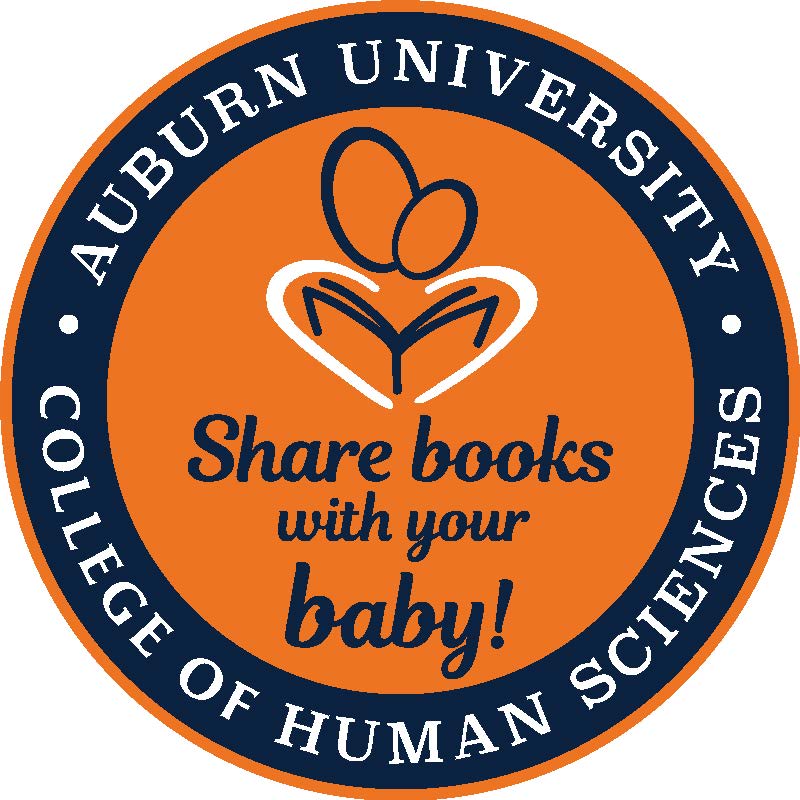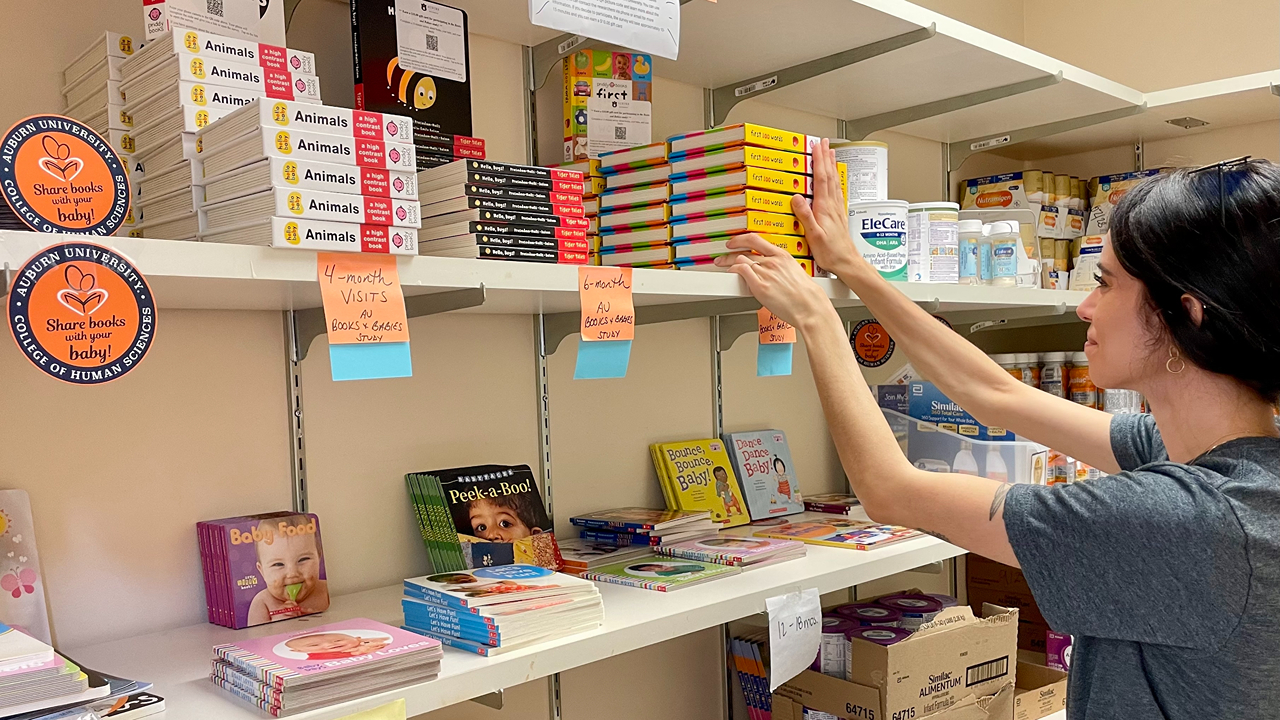content body
The ability to read is an essential and crucial life skill. In fact, you are currently displaying your literacy skills by reading this feature. Central to the recent data collected by researchers in Auburn’s College of Human Sciences is the idea that consistent shared book reading between parents and their babies during the early developmental stages of life can bring with it several positive benefits.
Guided by theory, research and practice — along with cooperation by caregivers and in partnership with Alabama pediatric clinic partners — waves of data focusing on families’ experiences with shared book reading, parents’ mental health symptoms, parent-provider relationship quality and more were collected and thus, the Books and Babies studies were born.

The researcher spearheading the Books and Babies studies is Cynthia Frosch, associate professor in the Department of Human Development and Family Science (HDFS), along with her graduate student research assistants, Olivia Martín-Piñón and Jamie Gensbauer. Sheila Sjolseth, a current HDFS doctoral student, and Kimberly Rogers, a graduate of the HDFS master’s degree program, were key contributors to the first wave of data collection for the study.
“Starting at birth, reading with children puts them on a path to success,” Frosch said. “I would say that it's never too early to begin sharing books with babies. Developing those routines can be a source of comfort, stability and familiarity for the parent-infant or caregiver-infant relationship. In addition, the benefits early literacy skills provide are far reaching. Children who hear more language and understand how books work have that advantage when they enter school.”
The first wave of the Books and Babies study was built on a theoretical framework to explore factors associated with shared book reading frequency including infant characteristics, parent/caregiver characteristics and social contextual factors. To bring this vision to life, Books and Babies 1.0 partnered with two Alabama pediatric clinics that are a part of the non-profit organization, Reach Out and Read.
Reach Out and Read was founded in 1989 to help families make reading a part of their routines and the organization serves as a critical partner in Auburn’s research. Part of Reach Out and Read’s strategic plan is to serve 10 million children by 2030 aiming to create a world where every family uses shared reading to build the bonds needed for their children’s health and future.
For the first wave of the Books and Babies study, data were collected in 2022 focusing on 70 parents of 4- and 6-month-old infants. Three different age-appropriate books along with three different posters that depict families reading with their babies were provided to clinics for clinic exam rooms. Families were also provided with a large magnet featuring the project logo and a message to 'Share Books with Your Baby!'

Pictured is a sample magnet with the project logo provided to families.
During a pediatric well-child visit, a physician or nurse practitioner provided a selected book to the family and discussed the benefits of early shared reading. Parents or caregivers then had the option to scan a QR code sticker placed on the book taking them to the study conducted by researchers for data collection.
“We felt really good about the quality of data that we obtained, and this is where the clinics play a crucial role as research partners,” said Frosch.
Findings from that pilot study showed that 77% of parents or caregivers reported a high-quality relationship with their infant’s pediatrician, and 57% of parents or caregivers reported being distracted by technology. This was important because the study’s pediatric clinic partners expressed an interest in understanding families’ technology use.
Interestingly, what affected shared book reading frequency the most was parents’ insurance type, mental health symptoms and perceptions of the parent-provider relationship.
“It's not just about early literacy. It's also about quality relationships,” Frosch said. “The quality of the relationship parents share with their pediatrician seems to matter for how frequently parents read with their babies.”
According to a recent U.S. Surgeon General’s Advisory on the Mental Health and Well-being of Parents, 41% of parents said that most days they are so stressed they cannot function, and 48% said that most days their stress is completely overwhelming.
“Our research is starting to uncover how valuable parents’ mental health experiences like anxiety and depression can be for understanding book sharing practices.”
“Our research is starting to uncover how valuable parents’ mental health experiences like anxiety and depression can be for understanding book sharing practices,” Frosch said. “If your family is economically stressed and doesn’t have access to high-quality, affordable childcare or if you're struggling with mental illness, that can create stress on families and add more burden. If you tell families to read more but they are facing these challenges, then that's not going to be supportive to families.”
Those factors were part of the focus of the Books and Babies 2.0 study in the summer of 2024 that doubled the number of Alabama Reach Out and Read clinic partner sites to four total. The data collected focused on 173 caregivers.
Findings from the second study revealed that the top three needs expressed by families were access to healthy food, access to affordable childcare and access to educational opportunities for their children.
Pediatric providers noted supports and resources for mental health as the top need for families. In addition, 94.7% of providers found that their clinic was either very successful or extremely successful when it came to meeting Reach Out and Read’s aims, and 65% reported that the Books and Babies study posters added value to promote shared book reading with families.
The Books and Babies studies are made possible thanks to grant funding provided to the EARLY Lab by the Women’s Philanthropy Board. The EARLY Lab, housed within the Early Learning Center on campus, focuses on early relational health, emphasizing caregiver-child relationships from birth through age five. Through research and practice, EARLY’s goal is to reduce disparities in socioemotional health and early language and literacy development, while strengthening relationships within families.
“I think we have been good stewards of those funds, and we were really intentional,” Frosch said. “Between planning the two studies, collecting data, purchasing all the books, driving to the clinics and buying custom book-shaped cookies for the pediatric providers to say thank you for their engagement, I feel really good about the work we did.”
As for the future, a third Books and Babies study is on the horizon. That study looks to expand recruitment while centering on family voice and asking new questions that focus on infant and parent sleep, parents’ feelings of judgement in the parental role and more.
“So much of research is behind the scenes, but with a project like Books and Babies, we can see the benefit our work has firsthand."
"Being a part of Books and Babies allowed me to see the real stakes of my doctoral work,” Martín-Piñón said. “So much of research is behind the scenes, but with a project like this, we can see the benefit our work has firsthand.
"Working in partnership with pediatricians was so impactful that it has inspired new directions for my future research, and that is what innovative higher education is all about: inspiring students and supporting the community that they serve."
Ultimately, the goal is to expand the reach of the study and promote early shared book reading within families as a tool to build strong relationships and to provide a foundation for lifelong literacy and learning.
“The most rewarding part of the project for me is the collaborative work with our clinic partners,” Frosch said. “That's been really neat, and I say to my students that at the end of the day, the worst-case scenario is we have gotten hundreds of books into the hands of families in communities throughout Alabama. That's a win-win. That is an outcome of the work that we have done where really no one loses.”
For more information about the College of Human Sciences' Department of Human Development and Family Science
HDFS




